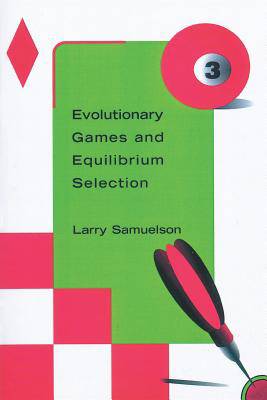
- Retrait gratuit dans votre magasin Club
- 7.000.000 titres dans notre catalogue
- Payer en toute sécurité
- Toujours un magasin près de chez vous
- Retrait gratuit dans votre magasin Club
- 7.000.000 titres dans notre catalogue
- Payer en toute sécurité
- Toujours un magasin près de chez vous
Description
The author examines the interplay between evolutionary game theory and the equilibrium selection problem in noncooperative games.
Evolutionary game theory is one of the most active and rapidly growing areas of research in economics. Unlike traditional game theory models, which assume that all players are fully rational and have complete knowledge of details of the game, evolutionary models assume that people choose their strategies through a trial-and-error learning process in which they gradually discover that some strategies work better than others. In games that are repeated many times, low-payoff strategies tend to be weeded out, and an equilibrium may emerge. Larry Samuelson has been one of the main contributors to the evolutionary game theory literature. In Evolutionary Games and Equilibrium Selection, he examines the interplay between evolutionary game theory and the equilibrium selection problem in noncooperative games. After providing an overview of the basic issues of game theory and a presentation of the basic models, the book addresses evolutionary stability, the dynamics of sample paths, the ultimatum game, drift, noise, backward and forward induction, and strict Nash equilibria.
Spécifications
Parties prenantes
- Auteur(s) :
- Editeur:
Contenu
- Nombre de pages :
- 328
- Langue:
- Anglais
- Collection :
Caractéristiques
- EAN:
- 9780262692199
- Date de parution :
- 01-09-98
- Format:
- Livre broché
- Format numérique:
- Trade paperback (VS)
- Dimensions :
- 152 mm x 228 mm
- Poids :
- 439 g







